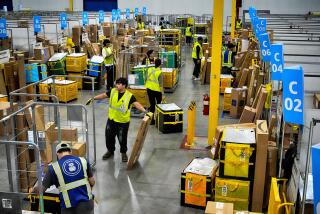China’s Economy Surges 9.5%
- Share via
SHANGHAI — Defying forecasts that its growth would slow this year, China’s economy expanded at a rapid pace of 9.5% in the first quarter, boosted by substantial gains in net exports and consumer spending, Chinese officials reported today.
The stronger-than-expected annualized growth rate matches China’s pace of expansion in the fourth quarter and all last year. Some analysts regarded it as a heartening indication that China -- one of two key drivers of global growth along with the United States -- will continue to boost activity around the world.
China is the world’s seventh-largest economy, and its booming growth has helped drive up demand and prices for oil and other commodities. By contrast, the U.S. economy is expected to grow about 3.6% this year, down from 4.4% last year.
However, Beijing has been trying to slow China’s growth to avoid bubble-type conditions, such as inflated real estate prices and factory overexpansion, that could lead to a crash landing. The latest rapid growth clip could prompt the government to further tighten controls on investment and credit.
The latest report also may be of little comfort to political leaders in Washington and the European Union. Amid signs of economic weakening in the United States and continued sluggishness in much of Europe, American and EU officials recently have stepped up pressure on Beijing to revalue its currency.
Those officials say the Chinese yuan, which is pegged to the dollar, is artificially undervalued, making Chinese exports cheaper in global markets. The result has been massive trade deficits with China, they say.
While Western trade officials have pressed the currency issue for more than two years, to no avail, in recent days President Bush has directly urged Beijing to take action. Lawmakers in Washington have threatened to slap high tariffs on Chinese imports if the Asian nation does not adjust its currency.
“People will be looking at China to share the growth ... and adjust global imbalances,” said Tim Condon, chief Asia economist for ING Financial Markets in Singapore, who was anticipating a high growth rate in the first quarter.
Many analysts, however, doubt that a yuan revaluation of even 10% will provide much benefit to the United States.
Of more immediate concern to Beijing, though, may be China’s deteriorating relations with Japan over long-simmering historical issues as well as more recent conflicts over energy resources.
Anti-Japanese protests in major Chinese cities in the last month have spooked foreign business executives in China and investors abroad. If demonstrations continue and the situation worsens, economists say, Japanese and other companies could pull back from China.
For now, there’s no indication of a withdrawal. Just this week, car companies at Shanghai’s Auto Show announced plans to expand production facilities in China.
And with Beijing opening up the domestic market more to foreign companies, many manufacturers and service companies are beefing up investments in China.
The sustained foreign investment was one factor behind the strong first-quarter numbers. Although China’s state-owned banks have reduced their lending to government businesses, under orders from Beijing, there’s still plenty of speculative money and underground banks supporting land development and new plants and equipment.
Indeed, total fixed investments, a measure of capital expenditure, increased nearly 23% in the first quarter, just a notch lower than the breakneck pace of the previous two quarters, officials reported today.
Recently, Chinese officials have taken additional steps to cool the hot real estate sector by imposing a capital gains tax and tightening requirements for new loans.
Yet even as the investment is becoming a diminishing part of China’s economy, the country is getting a bigger lift from exports, which rose 35% in the first quarter from a year earlier.
The surge was largely because of booming shipments of apparel and textiles after the expiration of a global quota system at the start of this year. At the same time, China’s imports have slowed as Beijing has tried to curtail investment.
China’s economy in the first quarter also was pumped up by a nearly 14% increase in consumer spending, which accounts for a little more than 40% of the country’s economic activity, compared with about two-thirds for the United States and some other developed nations. As Chinese incomes rise, however, consumption is expected to play a bigger role in sustaining the country’s growth.
In announcing the data today, a spokesman for the National Bureau of Statistics said he believed the 9.5% growth rate was acceptable. Analysts still regard it as a little fast. In its global forecast released this month, the International Monetary Fund projected that China’s gross domestic product, its total economic output, would grow by 8.5% this year, from 9.5% in 2004.
China’s strong and seemingly more balanced growth will support arguments that China can sustain a currency revaluation, which would probably take some of the steam out of the economy. Another factor that could undermine growth is China’s perennial energy shortages.
More to Read
Sign up for Essential California
The most important California stories and recommendations in your inbox every morning.
You may occasionally receive promotional content from the Los Angeles Times.














